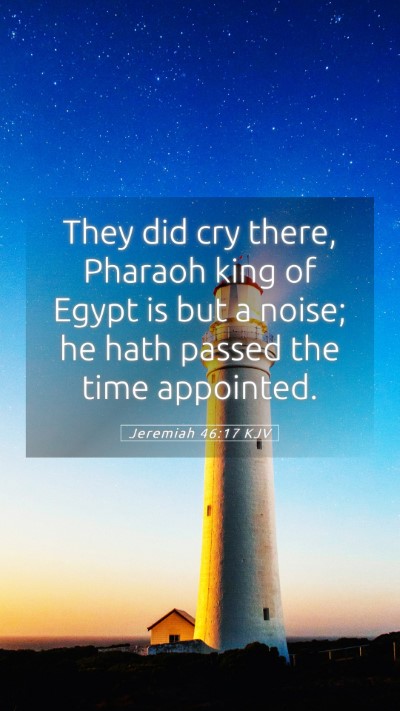Bible Verse Explanation: Jeremiah 46:17
Jeremiah 46:17 states, "They did cry there, Pharaoh king of Egypt is but a noise; he hath passed the time appointed." This verse offers profound insight into the transient nature of power and the ultimate futility of relying on human strength in the face of divine judgment.
Overview of Jeremiah 46
The chapter of Jeremiah 46 serves as a prophetic message concerning Egypt and its impending defeat. This message reflects not only on the political state of Egypt but also its spiritual condition.
Verse Meaning and Commentary
Examining this verse through various public domain commentaries provides a deeper understanding of its implications.
-
Matthew Henry's Commentary:
Henry emphasizes that the cry of the Egyptians signifies their panic and desperation as they recognize that their king, Pharaoh, has ceased to be a source of hope and strength. He interprets the verse as illustrating the reality that earthly rulers may create great noise but ultimately are powerless when facing God’s plans.
-
Albert Barnes' Notes:
Barnes points out that the proclamation about Pharaoh being "but a noise" symbolizes the ineffectiveness of his reign in the grand scheme of divine providence. He adds that this verse reflects the cessation of authority when God intervenes, showcasing the futility of Egyptian pride.
-
Adam Clarke's Commentary:
Clarke stresses the historical context of Egypt's military struggles, interpreting the verse as a cry of recognition from the people of Egypt that their doom was inevitable. He notes that this acknowledgment comes too late, revealing the consequences of misplaced trust.
Thematic Implications
This verse illustrates several key themes that are pivotal to understanding Scripture:
- The Transience of Human Power: Like Pharaoh, earthly rulers may seem mighty but are ultimately subject to God’s sovereignty.
- Divine Judgment: The context suggests that Egypt’s downfall was a result of divine retribution for their idolatry and oppression.
- Call to Repentance: This warning serves not just as a historical account but as a message urging nations and individuals to turn towards God.
Application in Modern Life
Understanding Jeremiah 46:17 in contemporary terms invites believers to reflect on their own sources of security and authority. In today's world, individuals may be tempted to place faith in politics, wealth, or status, yet this verse reminds that true power lies with God alone.
Cross References
This verse relates to several other Biblical passages that enhance its meaning:
- Ezekiel 30:13 - A prophecy against Egypt that reinforces the theme of divine judgment.
- Isaiah 31:1 - A warning against seeking help from those who cannot save, emphasizing reliance on God.
- Psalms 146:3-4 - A reminder that princes and human leaders are ultimately mortal and powerless.
Further Scripture Analysis
This exploration into Jeremiah 46:17 encourages deeper engagement with the text, inviting readers to explore:
- Bible Study Groups: Encourage discussions about the relevance of prophetic messages.
- Online Bible Study: Access resources that provide insightful commentary and historical context.
- Bible Study Tools: Utilize concordances and reference materials to understand themes within Jeremiah.
Concluding Thoughts
In summary, Jeremiah 46:17 serves as a poignant reminder of the limitations of earthly authority and the centrality of God’s sovereign will. As we engage with the Scriptures through study and reflection, let us consider its implications and applications in our lives today, ensuring that our trust rests firmly in the One who holds all power.


